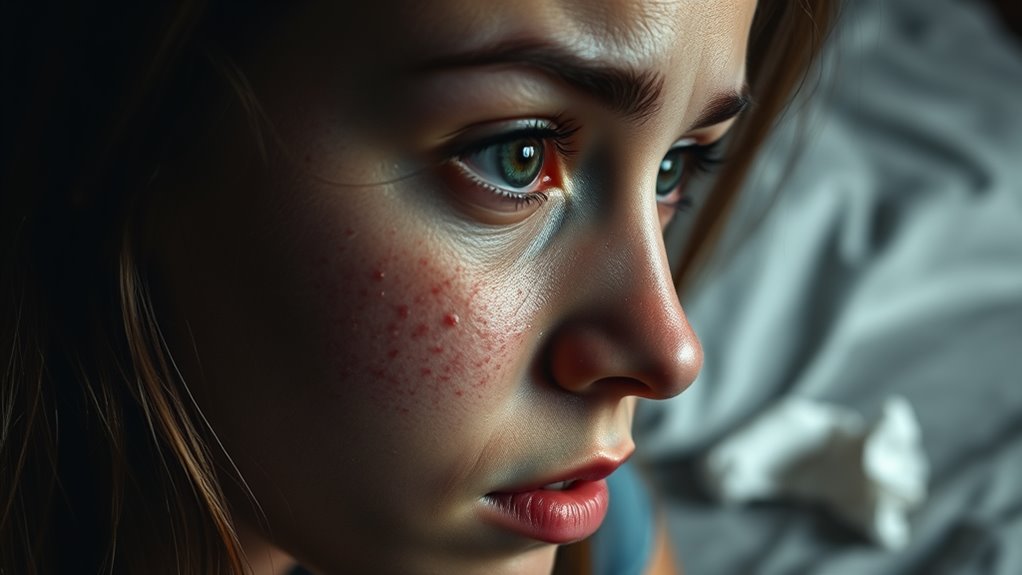The Unexpected Link Between Anxiety and Skin Breakouts
You might not realize how closely linked your anxiety is to skin breakouts. When stress hits, your body reacts with hormones that can wreak havoc on your complexion. This connection goes beyond just a few pimples; it can worsen conditions like eczema and psoriasis, too. Understanding this relationship is vital. So, what can you do to manage both your anxiety and skin health effectively? Let’s explore some strategies that may help.
Key Takeaways
- Anxiety triggers the release of stress hormones like cortisol, increasing oil production and leading to clogged pores.
- Elevated cortisol levels can cause skin redness and irritation, worsening the visibility of breakouts.
- Anxiety exacerbates existing skin conditions such as acne, eczema, and psoriasis through inflammation and increased oiliness.
- Effective management of anxiety through self-care and mindfulness can reduce skin breakouts and improve skin health.
- A balanced diet and proper hydration are crucial for maintaining both mental wellness and healthy skin.
Understanding the Science Behind Anxiety and Skin Health
When you’re feeling anxious, your body’s response can trigger a cascade of physiological changes that impact your skin.
Stress activates the release of adrenaline and cortisol, hormones that can lead to increased oil production and inflammation. You might notice your skin becoming more sensitive or reactive, making breakouts more likely.
Elevated cortisol levels can also impair your skin’s ability to heal, prolonging any existing blemishes. Additionally, anxiety may lead to habits like picking at your skin, further exacerbating the issue.
Understanding the connection between stress and skin health is essential for mastering your skincare routine. By managing anxiety through relaxation techniques and self-care, you can help mitigate its effects on your skin, paving the way for a clearer complexion.
The Role of Stress Hormones in Acne Development
Stress hormones like cortisol and adrenaline play an essential role in acne development, as they directly influence your skin’s behavior.
When you’re anxious, these hormones surge, triggering a cascade of effects on your skin:
-
Increased oil production: Your sebaceous glands go into overdrive, leading to clogged pores.
-
Inflammation: Elevated cortisol levels can cause skin to become red and irritated, worsening breakouts.
-
Impaired healing: Stress hormones slow down your skin’s natural healing process, prolonging acne visibility.
Common Skin Conditions Linked to Anxiety
Anxiety doesn’t just impact your mental health; it can also manifest in various skin conditions.
You’ll often notice that stress exacerbates issues like acne, eczema, and psoriasis. When you’re anxious, your body produces cortisol, which can lead to increased oil production and clogged pores, resulting in breakouts.
Eczema flare-ups may become more frequent as anxiety triggers inflammation, causing red, itchy patches on your skin. Similarly, psoriasis can worsen under stress, leading to painful, scaly plaques. Incorporating an essential skincare routine can help mitigate these effects and promote clearer skin.
Understanding these connections empowers you to recognize the physical manifestations of your anxiety, allowing you to take proactive steps.
Effective Strategies for Managing Anxiety and Skin Breakouts
While it’s easy to feel overwhelmed by the connection between your mental state and skin health, implementing effective strategies can help you regain control.
Start by prioritizing self-care techniques that reduce anxiety and improve your skin’s condition. Consider these powerful approaches:
-
Mindful breathing: Take deep, intentional breaths to calm your nervous system and reduce stress.
-
Regular exercise: Engage in physical activity that you enjoy, releasing endorphins and boosting your mood.
-
Skin-friendly diet: Incorporate nutrient-rich foods packed with antioxidants to nourish your skin and support your mental health.
Additionally, ensure you stay hydrated, as better hydration plays a crucial role in enhancing your skin’s natural beauty and overall health.
Holistic Approaches to Skin Care and Mental Wellness
When you embrace a holistic approach to skin care and mental wellness, you’re not just treating external blemishes; you’re nurturing your overall well-being.
Start by integrating mindfulness practices into your daily routine. Deep breathing, meditation, or yoga can reduce anxiety and improve skin health.
Next, prioritize nutrition; a balanced diet rich in antioxidants and omega-3s fuels both your skin and mind. Hydration is key too; drinking adequate water flushes toxins and promotes radiant skin.
Don’t forget to choose natural skincare products free from harsh chemicals, as they’re gentler on both your skin and your mental state.
Finally, make certain you get enough sleep, allowing your body to repair itself and maintain balance. Additionally, increased water intake not only enhances hydration but also contributes to clearer skin and improved overall health.
Frequently Asked Questions
Can Diet Influence Both Anxiety and Skin Health?
Yes, your diet can greatly influence both anxiety and skin health. By choosing nutrient-rich foods and avoiding processed ones, you can improve your mood and complexion, fostering overall well-being and resilience against stressors.
Are Certain Skin Types More Prone to Anxiety-Related Breakouts?
Yes, certain skin types, like oily or sensitive skin, may be more prone to anxiety-related breakouts. When you’re stressed, your skin’s oil production increases, leading to clogged pores and inflammation. Managing stress is essential for skin health.
How Long Does Anxiety-Induced Acne Typically Last?
Anxiety-induced acne can last anywhere from a few days to several weeks, depending on your stress levels and skin care routine. Managing your anxiety and maintaining a consistent skincare regimen can expedite healing.
Is There a Genetic Link Between Anxiety and Skin Conditions?
Yes, there’s evidence suggesting a genetic link between anxiety and certain skin conditions. If you have a family history of anxiety or skin issues, you might be more prone to experiencing these interconnected challenges.
Can Mindfulness Practices Help Prevent Skin Breakouts?
Mindfulness practices can considerably reduce stress, which often triggers skin breakouts. By incorporating techniques like meditation or deep breathing, you’re likely to enhance your skin’s health and appearance while promoting overall well-being and resilience.

